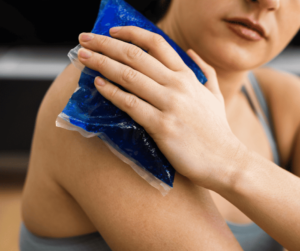If you have shoulder discomfort or pain, it can be truly debilitating. You need your shoulders for all sorts of movements, including lifting, pulling, or pushing.
Those are three motions that you use constantly in your everyday life, so if you’re having shoulder pain, it is hard to function normally.
Many people choose to see a physiotherapist, massage therapist, or chiropractor to manage shoulder issues. Some also take prescription medications. But are there other solutions to shoulder discomfort?
Today, we’re going to talk about some effective home remedies for soothing shoulder discomfort.
Simple Stretches to Ease Tension and Promote Flexibility in the Shoulder Joint
You can do various simple stretches at home to help ease tension, increase flexibility, and relieve pain.
1. Arm Across Chest Stretch
- Stand or sit up straight.
- Bring your right arm across your chest.
- Use your left hand to gently pull your right arm closer to your chest.
- Hold for 15-30 seconds and switch sides.
2. Behind-the-Back Arm Reach
- Reach your right arm behind your back and bend it at the elbow.
- Reach your left arm over your left shoulder and try to clasp your hands together.
- If you can’t clasp your hands, use a towel or strap to bridge the gap between your hands.
- Hold for 15-30 seconds and switch sides.
3. Overhead Triceps Stretch
- Raise your right arm overhead.
- Bend your elbow and reach your hand down your back.
- Use your left hand to gently push your right elbow.
- Hold for 15-30 seconds and switch sides.
The Role of Ice and Heat: When and How to Use Each for Optimal Relief
Knowing when you should use ice or heat for your injuries or pains can be confusing.
 Cold Therapy
Cold Therapy
Ice or cold therapy is best used for swelling, inflammation, and acute injuries.
If you have an injury that occurred within the last 48 hours, using ice is beneficial, as is the case if you have inflammation conditions such as tendonitis or bursitis.
Ice can also be helpful if you have swelling in the affected area.
If you’re applying ice, always wrap your ice pack in a cloth or paper towel to avoid direct contact with the skin, apply for up to 20 minutes at a time, and then allow the skin to return to its normal temperature before reapplying.
Heat Therapy
Heat therapy is best for muscle tension, soreness, stiffness, and chronic pain.
If you have long-term and chronic pain, use heat applications to help loosen muscles, increase mobility, and help increase blood flow to the affected area.
Just like with cold therapy, apply heat for up to 20 minutes at a time. Also, make sure that the temperature is not too hot, or else you might burn yourself.
Over-the-Counter Pain Relievers: What to Consider
Over-the-counter pain relievers can offer quick, short-term relief, and there are two main types to consider.
Anti-Inflammatories
Over-the-counter pain relievers, such as ibuprofen, target inflammation in localized areas.
These are also known as anti-inflammatories, as they can help reduce inflammation and target the source of the pain. However, these medications can be hard on the intestinal tract, especially if taken in quantity over a long period of time.
Anti-inflammatories, when taken in excess, can also cause stomach bleeding, gastrointestinal upset, and a variety of other side effects.
Pain Blockers
Pain blockers, Tylenol being a prime example, have acetaminophen as the main ingredient. These types of painkillers don’t actually target the source of the pain but rather stop your brain from receiving pain signals from your nerves.
It doesn’t take care of the actual problem; it just stops you from feeling the pain. The obvious issue is that if you can’t feel the pain, you may use your arm or shoulder as usual, making the situation worse.
The Therapeutic Benefits of Epsom Salt Baths for Muscle Relaxation
One way to relieve shoulder pain at home is by using an Epsom salt bath. The main benefits of Epsom salt baths include:
- Epsom salt baths allow the skin to absorb magnesium, which can be beneficial for alleviating muscle tension, spasms, and cramps.
- Epsom salt baths can help alleviate joint pain and sore muscles, not just because of the Epsom salt but also because of the heat.
- There are also some indications that Epsom salt baths can help reduce stress and improve sleep, both factors which may also help reduce overall pain and discomfort.
The above suggestions help many people manage their shoulder pain. If you experience persistent shoulder pain, visit a physical therapist such as RPM Physical Therapy in The Woodlands, TX.
Dr. Jonathan Ruzicka is a Manual Therapist whose experience as a private therapist for professional athletes drove him to further his education attaining unparalleled skills in tissue mobility work, performance based rehab, injury prevention, myofacial release and joint mobilization to optimize human performance.
- 5 Lower Back Pain Stretches to Ease Your Discomfort - August 23, 2024
- How to Avoid Foot and Ankle Pain and Stay Active! - July 26, 2024
- Essential Stretches for Sciatica Pain: Your Path to Relief - June 10, 2024


